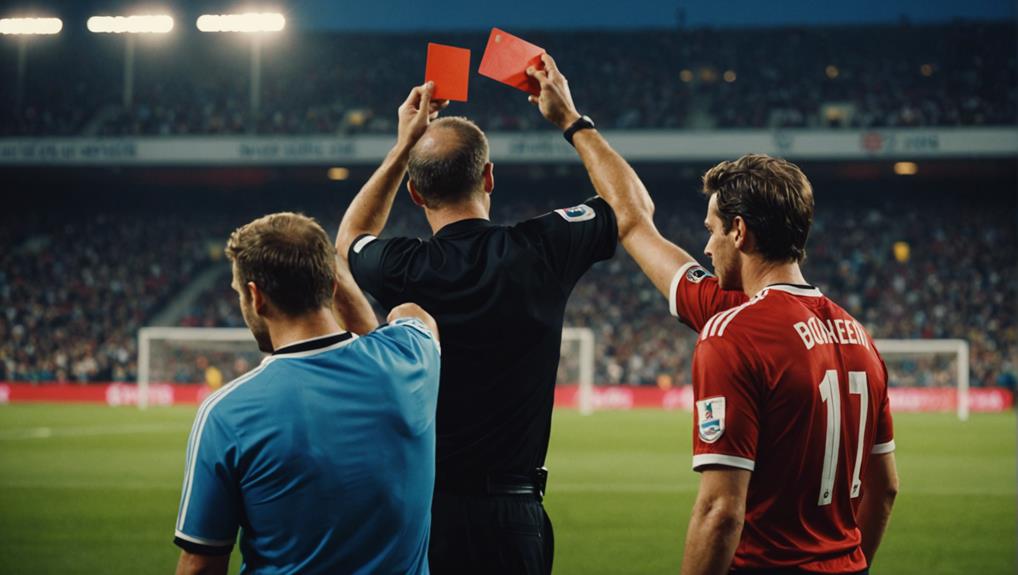
What Does a Red Card Mean in Soccer?
April 27, 2024When you see a red card in soccer, it means a player is ejected for serious foul play, violent conduct, or denying clear scoring chances. They must leave the field and sit out at least one game. Your team plays short-handed, needing to adjust tactics. No sub can replace the red-carded player. Referees prioritize sport behavior and safety. If you want to understand more about the impact and consequences of getting a red card in soccer, take a closer look at the reasons, penalties, and player suspensions.
Definition of a Red Card
Receiving a red card in soccer results in the immediate expulsion of a player from the game. This severe punishment is typically issued for serious foul play, violent conduct, or denying clear goal-scoring opportunities.
When a player is shown a red card, they must leave the field, and their team is left to play with one less player for the remainder of the game. The consequences extend beyond the current match, as the player who receives a red card is automatically suspended for at least one game.
This suspension serves as a deterrent against reckless behavior on the field and emphasizes the importance of fair play and sportsmanship in soccer. It also impacts the team's dynamics, forcing them to readjust their tactics and possibly suffer from a numerical disadvantage in future games.
As a result, a red card not only affects the player in the moment but also has lasting consequences for both the individual and the team as a whole.
Impact on Team and Player
After a player is shown a red card in soccer, the immediate impact on both the team and the player becomes evident. For the team, losing a player due to a red card means playing with a numerical disadvantage, affecting the overall strategy and dynamics of the game. This loss requires quick adjustments in tactics and formations to compensate for the missing player. Additionally, the absence of the red-carded player can't be substituted, further challenging the team's ability to maintain their performance.
On the player's side, receiving a red card carries the consequence of a mandatory suspension for at least one game. This suspension not only affects the player individually but also has repercussions on the team's future matches. The player must deal with the emotional and psychological impact of being sent off, while the team faces the challenge of playing without a key member due to the suspension. Overall, a red card significantly disrupts the balance and effectiveness of both the team and the player involved.
Common Reasons for Receiving

If you wonder why players get red cards in soccer, it often boils down to the types of fouls committed. Serious offenses like violent conduct or denying goal-scoring opportunities can swiftly lead to a player's expulsion.
Referees play an important role in deciding if an action merits a red card, influencing the consequences that follow.
Types of Fouls
Committing various types of fouls during a soccer match can lead to a player receiving a red card. Serious foul play, including dangerous tackles that endanger opponents, is one reason for a red card.
Another common cause is violent conduct, such as striking an opponent or engaging in aggressive behavior. Additionally, denying a clear goal-scoring opportunity through illegal means, like a deliberate handball, can result in a player being sent off with a red card.
It's important for players to maintain sportsmanship and abide by the rules to avoid these serious consequences. Remember, respect for the game and fair play is paramount in soccer to guarantee an enjoyable and safe environment for all participants.
Consequences of Red Card
Players who receive a red card in soccer face significant consequences, including immediate removal from the match and potential suspensions for future games. The red card is a serious disciplinary action that signifies severe misconduct like violent conduct, serious foul play, offensive language, spitting at opponents, or denying goal-scoring opportunities.
It's vital for referees to discipline players who engage in such behavior to maintain the integrity and fairness of the game. By issuing red cards, referees aim to uphold a standard of sportsmanship and safeguard the safety of all players on the field. These consequences serve as a deterrent against unacceptable conduct, emphasizing the importance of respect and fair play in soccer.
Referee's Decision-Making
When determining whether to issue a red card in soccer, referees assess the significance of player actions that endanger safety, violate sportsmanship, or breach game rules. Serious foul play, such as violent tackles or deliberate handballs, often leads to a red card being shown.
Additionally, aggressive behavior towards opponents or dissent towards officials can result in a player being sent off. Referees make split-second decisions based on their judgment of the situation, considering the impact on the game and the safety of the players involved.
Players must understand the consequences of their actions to avoid receiving a red card and potentially harming their team's chances of success. Referees play an important role in maintaining fair play and upholding the integrity of the game.
Penalties and Suspensions

Facing penalties and suspensions after receiving a red card in soccer is a common consequence for players. When a player is shown a red card, they're immediately sent off the field and typically face a suspension for at least one game. This means they'll be ineligible to participate in the next match.
Accumulating two yellow cards during a game also results in a red card and subsequent suspension. The significance of the offense committed by the player often determines the length of the suspension after a red card. It's important for players to adhere to the rules and regulations to avoid facing these penalties and potential suspensions.
Missing games due to suspensions can have a significant impact on both the player and the team, affecting their performance and chances of success in the competition.
Red Card in Major Tournaments
In major tournaments like the FIFA World Cup, a red card signifies serious foul play, violent conduct, or spitting. When a player receives a red card in these prestigious competitions, they're immediately ejected from the game and can't be replaced, leaving their team with only 10 players on the field. This can greatly impact the team's performance, forcing them to readjust their tactics and play more defensively. Additionally, players who receive a red card are automatically suspended for the next match in the tournament, further affecting their team's chances of success.
Serious foul play, such as dangerous tackles or intentional harm to an opponent, isn't tolerated in major tournaments, and referees are quick to brandish red cards to maintain the integrity of the game. Similarly, violent conduct, including physical altercations or aggressive behavior towards officials, can result in an immediate sending off. Players must adhere to the rules and regulations to guarantee fair play and sportsmanship in these high-stakes competitions.
Fair Play and Sportsmanship

Embrace the values of respect, ethics, and adherence to rules on the field.
Displaying sportsmanship towards opponents and officials is vital for the integrity of the game.
Upholding fair play guarantees a competitive yet honorable environment for all players.
Respect for Opponents
Respecting opponents by playing with integrity and following the rules is vital in soccer to maintain fair play and sportsmanship. When players fail to show respect towards their opponents, it can lead to receiving a red card.
Disrespectful behaviors such as aggressive tackles, verbal abuse, or unsporting conduct towards opponents can result in disciplinary actions like red cards being shown. To uphold fair play and create a positive environment on the field, it's essential for players to treat their opponents with respect.
Ethical Behavior On-Field
Demonstrating ethical behavior on the field in soccer involves upholding values such as honesty, respect, and integrity. When players adhere to these principles, it fosters fair play and sportsmanship, creating a positive atmosphere for all involved.
Upholding ethics in soccer means treating opponents, officials, and teammates with respect, even in the face of challenges. Failure to display ethical conduct can result in disciplinary actions such as receiving a red card. This severe penalty serves as a consequence for actions that go against the ethical standards of the sport.
Upholding Rules and Spirit
Adhering to the rules and spirit of fair play and sportsmanship is vital in maintaining the integrity of soccer on and off the field. When a player receives a red card, it's important to reflect on the values of fair play and sportsmanship. Fair play encompasses respecting the decisions made by officials, refraining from unsporting conduct, and upholding the principles of honesty and integrity.
Sportsmanship goes beyond the rules, emphasizing respect towards opponents, displaying integrity, and competing with dignity. Upholding these values not only benefits the individual player but also contributes to a positive and respectful environment for all participants.
Conclusion
So, next time you see a player getting a red card in soccer, remember that it's just a friendly reminder to take a little break and reflect on their actions.
It's all part of the game and a way to guarantee fair play and sportsmanship.
Keep enjoying the beautiful game and appreciate the drama and excitement that comes with it!


